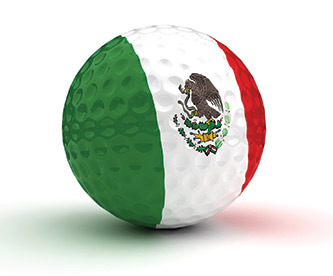Sociology: Golf and Power
Golf is a relatively accessible sport in four countries—United States, United Kingdom, Australia and Argentina. Access to golf courses in all other countries requires membership in expensive clubs, and sociologist Hugo Ceron-Anaya examines gender and bodily dispositions on the golf course in contemporary Mexico.
Ceron-Anaya, assistant professor of sociology and anthropology, focuses on the sociological notions of golf among affluent players. He has found that the racial, class and gender categories present at Mexican clubs are also found at other places of power. He traveled to multiple golf clubs in Mexico and interviewed club members and staff about the traits needed for joining golf clubs. High class, good moral standing and large amounts of money were required for admission.
“People use golf when they conduct business,” he says. “Just as importantly, they use golf to make connections and create business and social networks. The people you find playing golf are very similar, in background, to the people you find at exclusive universities or in top corporate positions or high-ranking government positions.”
Golf clubs, however, are hidden sites in Mexico. They are often tucked away from public view, secluded by fences or bushes to deter outside visitors, creating an invisible environment for a select few.
“There are few green spaces in places like Mexico City, where there are natural resource issues, such as access to water. This invisibility prevents any discussion about public resources. These green spaces are being used to benefit small, wealthy communities.”
Ceron-Anaya contends that golf clubs are based on traditions that naturalize otherwise irrational relations, such as gender bias.
“Women are perceived as being inferior in this perception of power. For example, women are not banned from areas like the 19th hole (the bar), but they are not accepted. It perpetuates this view that women are not normal golfers. They are the others. Unsurprisingly, you also rarely see women in other positions of power, like corporations or the government. In fact, you can trace changes in the history of the state by looking at history in this sport. Both are part of the same field of power.”
Posted on:


